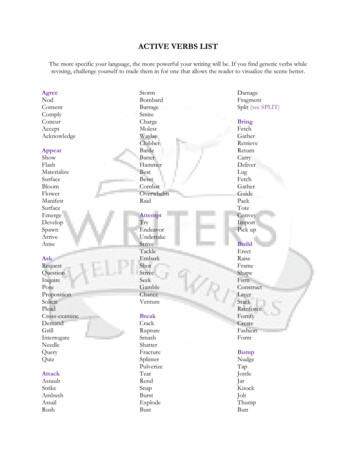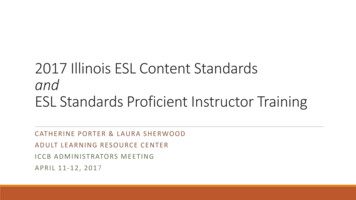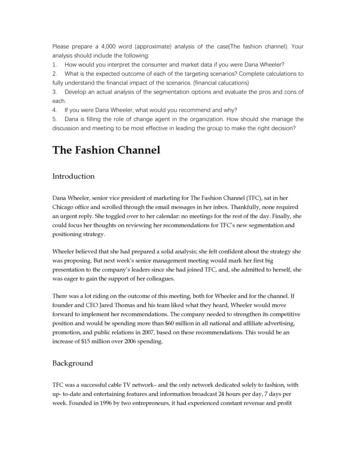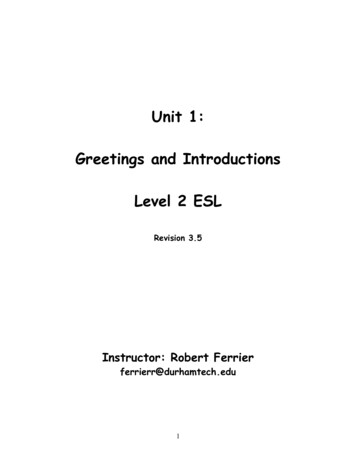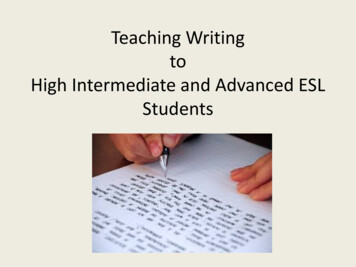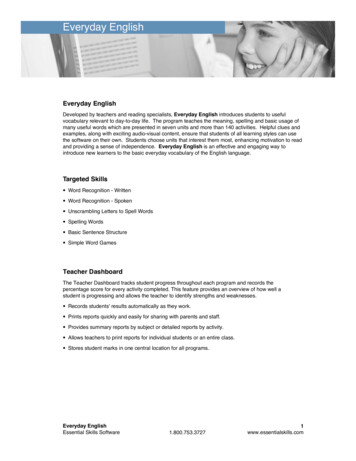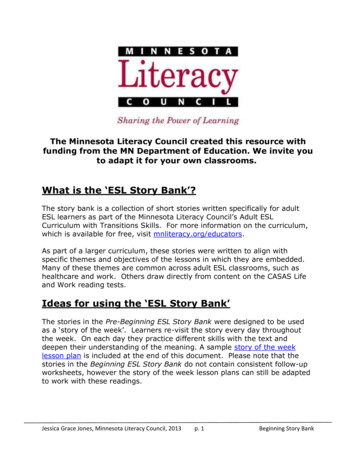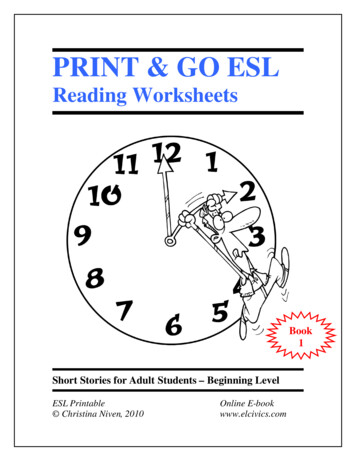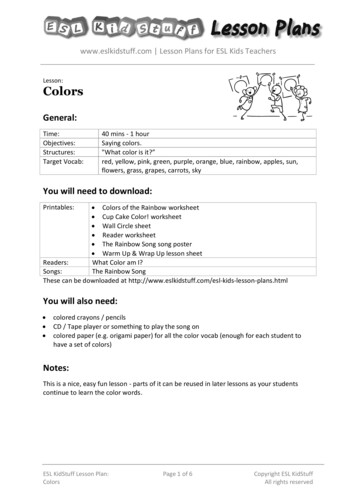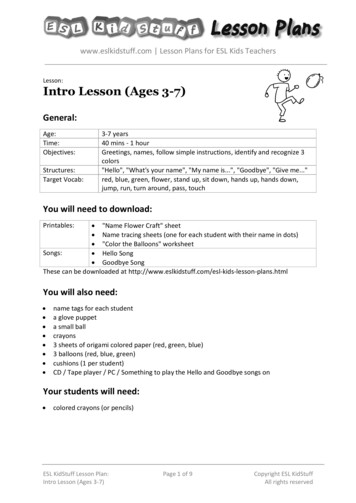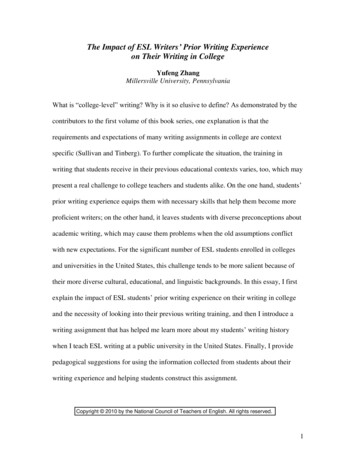
Transcription
The Impact of ESL Writers’ Prior Writing Experienceon Their Writing in CollegeYufeng ZhangMillersville University, PennsylvaniaWhat is ―college-level‖ writing? Why is it so elusive to define? As demonstrated by thecontributors to the first volume of this book series, one explanation is that therequirements and expectations of many writing assignments in college are contextspecific (Sullivan and Tinberg). To further complicate the situation, the training inwriting that students receive in their previous educational contexts varies, too, which maypresent a real challenge to college teachers and students alike. On the one hand, students‘prior writing experience equips them with necessary skills that help them become moreproficient writers; on the other hand, it leaves students with diverse preconceptions aboutacademic writing, which may cause them problems when the old assumptions conflictwith new expectations. For the significant number of ESL students enrolled in collegesand universities in the United States, this challenge tends to be more salient because oftheir more diverse cultural, educational, and linguistic backgrounds. In this essay, I firstexplain the impact of ESL students‘ prior writing experience on their writing in collegeand the necessity of looking into their previous writing training, and then I introduce awriting assignment that has helped me learn more about my students‘ writing historywhen I teach ESL writing at a public university in the United States. Finally, I providepedagogical suggestions for using the information collected from students about theirwriting experience and helping students construct this assignment.Copyright 2010 by the National Council of Teachers of English. All rights reserved.1
ESL Writers and Their Writing ExperienceIn recent years, the number of college-level ESL writers in the United States has beenincreasing rapidly. As noted in a statement issued by the Conference on CollegeComposition and Communication, these ESL writers, including refugees, andinternational visa students, as well as permanent residents and citizens who have receivedat least part of their precollege education in the United States or Canada, can be found notonly in basic writing or first-year composition programs but also in professional writingand writing across the curriculum programs (669). Since ESL writers have to write in alanguage that is not their native language and are often judged by readers who might notshare their cultural backgrounds, value systems, or criteria of ―good writing,‖ they tend tobe disadvantaged in academic contexts. Therefore, in addition to the challenges oflearning a new language, ESL writers ―may have special needs because the nature andfunctions of discourse, audience, and persuasive appeals often differ across linguistic,cultural and educational contexts‖ (670). To better address ESL students‘ special needsand help them become more proficient English writers, it is necessary for writing teachersto get to know their students: not only their cultural and educational backgrounds ingeneral but also the specific writing training that ESL students have been exposed tobecause students from similar backgrounds may not necessarily share exactly the samewriting experience (Matsuda 53).Writing is a social entity; learning to write in a new language encompasses morethan just the ability to use grammar and vocabulary appropriately in that language. Amore challenging aspect of writing is that the values and conventions of literacy can varyacross cultures, contexts, and disciplines; therefore, to teachers of ESL writers, it is2
essential to first find out their students‘ existing literacy assumptions by examining theirprior writing experience.First, ESL students‘ writing experience in their first languages (L1) plays asignificant role in shaping their perceptions of the expectations and purposes of theirwriting in a second language (L2). Although ESL writers with more L1 writingexperience usually tend to have more writing strategies at their disposal, and thereforetend to be more proficient in L2 writing (Cumming; Kobayashi and Rinnert; Sasaki;Sasaki and Hirose; Zainuddin and Moore), not all strategies are compatible with theexpectations of the L2 academic contexts. ESL writers, especially those who are veteranwriters in their native languages but novice writers in English, may assume that modelsof their L1 writing can be transferred to L2 writing without being aware that literacynotions such as criteria of ―good‖ writing, approaches to certain genres (personal,argumentative, or narrative, for example), or even attitudes toward texts can be culturallyvaried and culturally specific (Basham, Ray, and Whalley; Bell; Dong; Li; Phung; Purves;Reichelt; Soter). Therefore, ESL writers‘ bilingual or multilingual identities andeducational experiences cannot be ignored.Based on my own teaching experience, I have learned how basic concepts such ashaving a thesis or supporting main ideas with specifics in academic writing can beproblematic to novice ESL writers. For instance, a student from Taiwan, who immigratedto the United States when she was a sophomore in college, once wrote about herunderstanding and attitude of the ―American style‖ of writing and how she had struggledto see the significance of a thesis in English writing: ―It sounded ridiculous to me to havea thesis statement and emphasize this thesis in each single paragraph, which seems that3
writers apparently think their readers are not smart enough to follow what they are tryingto express. It didn‘t make sense to me.‖ Similarly, another student from the United ArabEmirates shared with me, in a study I conducted, the painful efforts she took in order tosee what being ―specific and straightforward‖ means in English writing, because writingin Arabic, her native language, is different: ―In Arabic, you don‘t have to be specific.When you write, your writing can have different meanings, it can be interpreteddifferently. You use a lot of metaphors, it doesn‘t matter if you don‘t understand it. Youcan interpret it in your own way, you can establish a new idea. You don‘t have to have aconclusion‖ (Zhang, ―Task‖ 64–65). The ESL students in both cases were strong L1writers, and, probably because of that, the conflicts between the new expectations in L2writing and the well-established notions of writing derived from their L1 writingappeared to have incurred even more confusion and frustration.Second, as diverse as their L1 writing experience is, ESL writers‘ L2 writingtraining contributes to their various conceptualizations of academic writing, too. Forinstance, some of them may have attended high school in the United States, some havestudied in language institutes in the United States before enrolling in college, some havestudied in English-medium international schools back in their home country, and somehave studied in their local high schools where English is not greatly emphasized. As aresult, when it comes to English writing, ESL writers have been exposed to differentgenres, the level of their involvement in a particular genre differs, and their approaches tosimilar writing tasks can be different.Just like their L1 writing experience, ESL writers‘ diverse L2 writing experiencesexert a great impact on the way they construct their writing assignments in college (Allen;4
Hamp-Lyons; Zhang ―ESL‖): Is audience analysis really necessary? What role canpersonal perspectives or experience play in academic writing (are they compatible witheach other)? What does ―respond to and integrate your reading material‖ mean when youwrite? These questions might seem simple and straightforward to writing teachers, butESL students may come up with a variety of answers and responses. For example,Allen‘s study of a Japanese L2 writer illustrates how prior L2 experience with usingcitations can influence ESL writers‘ perception of and approach to a task. The ESLstudent in that study learned from a previous teacher the significance of supporting herargument with source information, which made her believe that she had to ―have areference to ANYTHING‖ (83), so she chose to sacrifice her own ideas when there wereno references available to support them. As the researcher observes, the writer‘s―overriding concern with referencing had prohibited her from elaborating and henceprogressing with her writing‖ (84).Third, as college students, ESL writers not only write for composition classes butalso for content courses in their major or minor areas; since the requirements for writingassignments in these areas are usually discipline specific and different from course tocourse, it is especially critical for ESL students to be sensitive to any new expectations orguidelines and wisely use their writing strategies accumulated from previous writingcontexts. Since most English or writing classes that ESL students take in precollege orcollege contexts focus on general language or academic skills, many ESL writers are notprepared to write for new, specific discourse communities, or to be able to ―express theirknowledge about academic subject matter in modes of English writing appropriate to theacademic discipline and tasks assigned‖ (Cummings, Erdosy, and Cumming 69). As5
Harris illustrates in her article, an A student in an advanced composition course canstruggle desperately to ―GET TO THE POINT‖ in one of his writing assignments for hisengineering class (121–122). As an ESL writing teacher, I have learned how angry andfrustrated students can be when, after many years of (successful, for some) English study,they are regarded as bad writers by professors from other disciplines based on criteria thatthey have never heard of before.Because ESL writers‘ diverse prior writing experiences may impact the way theyinterpret and perceive writing assignments in new academic contexts it can be moredifficult for them to adjust to the various expectations from one context to another. As awriting teacher, I believe the first step to helping these students is to learn more aboutthem: their previous writing experiences, especially their implicit assumptions of literacy.Only in this way can writing teachers better address students‘ individual needs and at thesame time understand and do justice to the variations demonstrated in students‘ work.Since each writer is a unique individual with different cultural, educational, and writingbackgrounds (Matsuda 53), the best way to achieve this is to let students tell their ownstories as writers. Therefore, I present a writer‘s autobiography assignment that allowsme to know more about my students‘ literacy history.Writer’s AutobiographyWhen I teach English 106I (first-year composition for ESL students) at a publicuniversity in the U.S. Midwest, the first paper I usually assign is the writer‘sautobiography, in which students write the stories of their development as writers. Theuniversity where I teach has one of the highest enrollments in the United States of6
international students. For the 2007–2008 academic year, it had an enrollment of nearlyfive thousand international students from 123 countries; 424 of those were first-yearstudents. Generally, there are eight sections of English 106I each semester, with amaximum of fifteen students in each section. Because the university sets a high thresholdfor English proficiency in its international undergraduate students, most students in myEnglish 106I class are high-intermediate or advanced ESL learners in terms of both theirTOEFL scores and their oral communication skills. However, like most ESL students inthe United States, these students have received varying levels of pre-university training inEnglish writing as a result of their diverse educational backgrounds.Following is the assignment introduction that is distributed to students.ENGLISH 106IFIRST YEAR COMPOSITIONWriter’s Autobiography AssignmentIn a paper of 750–1000 words, write the story of your development as a writer—in bothyour native and second or foreign language(s). Consider your entire life, includingpreschool years, and do not limit yourself to school experiences.Below are some areas of your experience to consider:people who influenced your writingmemories of successes and failures in writingyour attitudes toward writing (positive or negative, and why)your strengths and weaknesses in writingkinds of writing you have donein-class or out-of-class activities to guide or facilitate your writing7
You need not write about all of these areas or follow this order in your paper; thepurpose of thinking about these topics is to help you recover relevant memories. Youneed not address these areas with the same level of detail, either.Although the assignment asks you to focus on your writing history, you might have toinclude certain experiences that do not explicitly relate to writing but provide a context forthose experiences.For many students, this assignment allows them to view themselves as ―writers‖for the first time in their lives, despite the fact that they have produced numerous writingsbefore. By recollecting and sharing their writing experiences, students take more pride intheir literacy history and therefore gain more confidence in their writing skills. As for me,I learn more about each student through this assignment, both as a writer and as a person.Sample Student EssaysThe first sample essay was written by Mohamed, a first-year student in computerengineering. Based on student information collected at the beginning of the course, Iknew he came from the United Arab Emirates and was a native speaker of Arabic. Hecame to study in the United States after finishing high school when he was about eighteenyears old. Before his enrollment in college, he studied in an intensive English languageprogram in Philadelphia for one year. As Mohamed wrote in the essay, his precollegeEnglish writing experiences were quite limited in high school back in his home country,but as a writer he benefited greatly from his one-year study in Philadelphia.8
Mohamed’s EssayBeing a writer is like being a river: the more a river takes substances and materials fromits surroundings, the stronger it gets, for such materials provide the river with a strongerability to flow. Eventually, the river ends up with throwing all what it has inside to thehuge and open ocean. Those materials become a bond between the river and the ocean.Similarly, a writer gets more efficient by collecting experiences. With more experiences,a writer would have more intensive emotions to eventually burst them up to people aspieces of paper, which become an eternal bond between the writer and the readers.As a person who is fond of writing, I had many experiences in this field. Initially, Istarted to know writing from my brother, who is a great writer in my opinion. So, beingimpressed by him, I started trying to write my own stories. Gradually, my Arabic teachercame to notice my writing abilities, and assigned me to the head of the literatureactivities club in elementary school. Moving on to high school, I continued my journey inthe writing realms, but from different approaches. At some point in my life, I had to learnfor the first time to write in English, which was a very minor issue in my school years.Thus, I became to realize more facts and face tougher challenges in my life.First of all, before I got to know writing, I was an avid reader. I always went todifferent libraries and book fairs with my father, searching for every single children‘sbook. Also, I enjoyed watching Japanese animation that contained lots of complex storystructures. However, I never thought, at that time of my life, of creating my own stories,until my brother did. He was always considered as the creative member in our family, forhe enjoyed writing the most. Thus, I began to have a particular interest in his writings,and also in the idea of writing itself. I tried at the beginning to write something seriousand dramatic, just like my brother. But, I couldn‘t find my way out of the first line; I simply9
couldn‘t use the words I have learnt to truly express myself. Fortunately, that wasn‘t theend, for one day in my elementary school, I received a twenty out of twenty, for the firsttime ever, in my Arabic essay class. After that class, the teacher asked me to come withhim privately, in order to praise me! At those moments of praise, I was simply petrified,for the first step of my newly-born dream has been successfully done.From that day, I felt more acquainted with writing, especially in the comedy partof writing. I used to write some excessively sarcastic stories to my friends, about somefantasy adventures. Frankly, they love reading those stories very much. Also, my Arabicessay teacher assigned me to the head of the newly formed literature activities club. Interms of writing, my life seemed an absolute perfection, at that time of my life. However,this living dream didn‘t continue forever, for as soon as I reached junior school, mywriting path has drifted away; my new essay teacher in my new school was simplyinactive. Even though he was a good teacher, he always ignored the class‘s suggestionsto do any kind of activity, and neither did he care of forming a literature club at all. Also,my new classmates were different, for many students lose their innocent spirits as theyget to junior school in my country, and consequently, their interest in reading and writing.In other words, I didn‘t get enough support from my surroundings, which were my guidesin writing in elementary school. Thus, I began to lose my passion for writing, eventhough I continued to read more than ever. I felt like wherever I searched for somewords to express within my heart, I trembled upon the ashes that were left by the fire.Years have passed, and I was done from my high school with tremendousscientific success, when the time has arrived to provide me with even tougher writingexperiences. After finishing high school, the president‘s office of scholarships in mycountry offered me to go to the USA for university studies. At the beginning, I hesitatedvery much to accept such a risky adventure, for I lived my whole life in my country.However, after lots of thinking and meditation, I finally decided to go over the seas, for10
such challenging task might force me to recall the fire within my soul. Everything wasarranged, and it was time to begin my English Language Programs in Philadelphia,Pennsylvania.Before going to Philadelphia, my English writing experiences were very limited,for the education of the English language itself in my country is weak. For example, towrite an essay, we used to memorize some specific paragraphs from our textbooks inorder to ―copy‖ them in a ten line essay. The best combination applied from thoseparagraphs earns a full mark immediately. Thus, even though I used to get full marks inthose ―essays‖, I never really experienced even the basics of English writing skills, formemorization is way far from that. Consequently, for me, Philadelphia represents anultimate challenge that I‘ll never forget in my life, as it was the first place where I had towrite real essays in English.Initially, I wasn‘t very scared or intimidated by this idea, for I thought it would beeasy to apply my previous writing skills again, although in a different language. Besides,my English vocabulary wasn‘t bad at all, and consequently, I thought that, with somemore concentration, I would be able to impress my English teachers in the same way asmy elementary Arabic teacher. However, even though I finally managed to write with thesame old passion, the results were ultimately different; in my first paper, negativecomments from my teacher were almost per word. Simply, she told me that none of myideas are expressed clearly. Furthermore, all my organizational skills in the paper are ina terrible shape. She even couldn‘t understand the overall picture, for according to her,my writing is filled to the extreme with metaphors, awkward twists, and mysteriousstatements. In other words, my English teacher couldn‘t grasp the ideas as my Arabicteacher did, and neither did I grasp the reasons behind such awful result at thebeginning.11
Thus, despair and regret began to grow within my soul gradually. I believed firmlyat some point that my writing ability had vanished forever. However, a dear friendadvised me to consult an essay tutor, or an advisor that might be able to help me realizethe problems I have and solve them. So, moving on, I met an advisor, and that was oneof the best things I ever did. That advisor, which I owe my writings improvement to her,was an angel that held me tightly, with lots of writing assignments, but with fruitful results.She identified my main problem, which was the poetic style of my writing. She told methat an evocative writing style, that I used to follow in my Arabic writings, doesn‘t work inthe USA, because the American style of writing is linear. Americans want a very clearand specific kind of essay, without lots of twists and loops. Also, she volunteered to giveme some of her own time in order to work on my writing as much as possible, all infriendly and humorous atmosphere. Even though my sessions with her were long anddifficult, I still managed to persevere, for I felt the intensity in her care and support, likemy elementary Arabic teacher. Sometimes, she tended to be harsh with her comments,but that affected me positively; those comments made me truly understand my mistakesand the reasons behind every single one of them. Day after day, I started to feel moreencouraged and more confident than ever. I concluded my experience with thiswonderful person, besides having an unforgettable memory, by two of the most valuablelessons ever.First of all, I don‘t need to be a perfectionist writer all the time, and I shouldalways accept negative comments on my writings. Instead of depression, I have to workon correcting my mistakes as hard as possible. So, I know now, thanks to her, that I canbe a great writer, but not without faults. Another important lesson is that I can alwaysimprove upon my writings, either in Arabic or English, but I need to be always strong,and ready for the worst, not just in writing, but in all of my life aspects.12
To sum up, even if a river has a tremendous energy and huge amounts ofmaterials, it still can fail to throw its ingredients to the ocean, if it ever gives up in front ofan obstacle. As long as there is a valley, a river would never stop flowing, no matter howmany obstacles it faces, for it has the natural perseverance ability within its flow thatwould eventually enable it to fulfill its eternal duty.AnalysisEven though, linguistically speaking, this essay is not one of the best I received inresponse to this assignment, I still consider it a strong paper. What I like most about it isits rich content and clear explanations: Mohamed, a first-semester student in computerengineering, shares with us his growth as a writer in both his first language, Arabic, andsecond language, English. With vivid details, he identifies the people who had inspiredhim, encouraged him, and helped him in his journey as a writer; at the same time, hehighlights his achievements in Arabic writing and his initial struggles in ESL writing, aswell as how he overcame the difficulties in ESL writing and the accompanying anxiety heexperienced when he studied at a language institute in the United States.More interestingly, as Mohamed unfolds the stories, he reveals his changingassumptions about English writing: At first he believed that it should work the same wayas Arabic writing, but later, under the influence of one of his advisors, he viewed Englishwriting as ―linear‖ and straightforward, especially compared with Arabic writing, whichis full of metaphors and ―mysterious statements.‖ I have to admit that it was thanks tothese stories that I was able to better appreciate this essay: Now I understand that theanalogies at the beginning and the end of the essay, together with the metaphorical13
language in the text (for instance, ―I trembled upon the ashes that were left by the fire‖)were not used randomly; they were rhetorical strategies Mohamed borrowed from hisfirst language writing (which worked successfully in this case) to enhance the style andeffectiveness of his essay. In addition, I also like the transitional signals in this essay thatlogically connected the different stories; all together, they built up the theme of the essay.The second sample was written by Rahyu, who was an eighteen-year-old, firstsemester student in computer science. A native Indonesian, Rahyu studied in an Englishmedium school for more than six years in Singapore before coming to the United States.Rahyu’s EssayAt the start of this semester, I have just started to learn how to write Chinese charactersand the most I can write is three sentences of conversation and truthfully speaking, I feltperfectly happy with that. Thinking back now, I must have started with these types ofassignments when I was little. I am sure, the feeling was the same, maybe even more.The happiness that I felt must have been overwhelming. Since when then, I felt a senseof laziness in writing?I went to the same primary school which my siblings all went to. All of them aresmart and they are very proficient in writing in Indonesian language. I guess, that wasone of the reasons I started to dislike writing. Sometimes, I felt compared to my siblings,as the teachers have high expectation of me. The homework assigned everyday was ofno help to lighten my feelings toward writing. Almost everyday, we were givencompositions to write and sometimes, reading comprehensions to do. To write was just achore for me that can bring no sense of enjoyment.14
In fourth grade, I started learning English language. It was still the basics like ―Ais for ‗Apple‘‖. Different from learning Chinese, I felt no sense of achievements inlearning this new language and there was nothing I could be proud of and at that timeand I still did not value writing. I tried to write composition assignments as short aspossible, enabling me to spend my time doing other things like playing game.After my first year in secondary school, I was sent oversea to Singapore tocontinue my studies there. I attended language school for half a year to prepare myselfso that I will be able to follow the lessons in Singapore which are delivered in English. Itwas then that, I struggled in writing compositions. I would receive only a pass grade formy English lessons. I felt helpless in my English class as I could not seem to catch withto my classmates in terms of quality or quantity in my writing. Expressing my thoughts inEnglish was difficult. I seemed to run out of words and things to write about quickly. Thethings which I write about were mostly narratives. I remembered trying to write about afantasy type narrative but I found out that such theme is not suitable for secondaryschool assignments. The theme will require a much longer range of words. A mere 350words are not sufficient to cover the characters and storyline. My teachers advised me tostay back to write normal narrative compositions.Next, in my junior college (Junior College is a high school level of institution inSingapore that consists of 2 years), my first year went pretty much the same. But in mysecond year, I had an excellent teacher. She was tireless in trying to help my classmatesand me in improving ourselves. Also, it seems we also wanted to prove that we can do itto her. Most of the writing done during my Junior College life was either descriptive orargumentative types. She was very strict in marking and I have only passed once beforewith her marking my papers. She made her students undergo lots of practice. We weretaught ways to start off a composition, how to write the contents of a paragraph and alsowe were told to read newspapers to get contents for what we are writing on. I guess she15
was pretty influential in improving my writing ability as my final grade for ‗A-level‘(Thename for the national final examination for Junior College) was B 3(between 65-69%).Also, at the beginning of the academic year, the passing rate at my class was 0% buttowards the end, there was more than 70% passes. However, then, I still thought writingwas unpleasant, it was just another thing that I had to do to get my grades in a class.The only activity involving writing outside classes is chatting over the net. Duringmy second year of Junior College, I started to explore the world of mIRC (internet relaychat) to download mangas (Japanese comics) and at the same time, I will chat there torelieve myself of my everyday chores. Overtime, I made lots of friends and we still chatwith one another a lot even now. I personally prefer chatting online than to speakverbally in real life. There are many reasons for that, one of them is, I feel moreconfident when chatting because I am better at typing than I am at pronouncing words.Also, I do not feel restricted when I am chatting there. Moreover, I do not need to keepup an image in there, the truth is, personally I think the worse a person‘s image is there,the more fun it is to chat with him.However, there is one person who has greatly influenced me that, now, I like towrite and express myself in what I write. His website, where he put his blog (internetjournal) has lightened my feelings. He was so open about his life, no shame in whateverridiculous things that he had done. Thus, I started to follow what he did. I made awebsite of my own and there, I posted my experiences in lives. Although, I am not asshameless as he is, that is, I am still selective in doing ridiculous things in life. I started totake pride in writing and expressing myself. I feel as if it feels good to share with theworld about myself, and I just hope they enjoy it too. Most
In this essay, I first explain the impact of ESL students‘ prior writing experience on their writing in college and the necessity of looking into their previous
